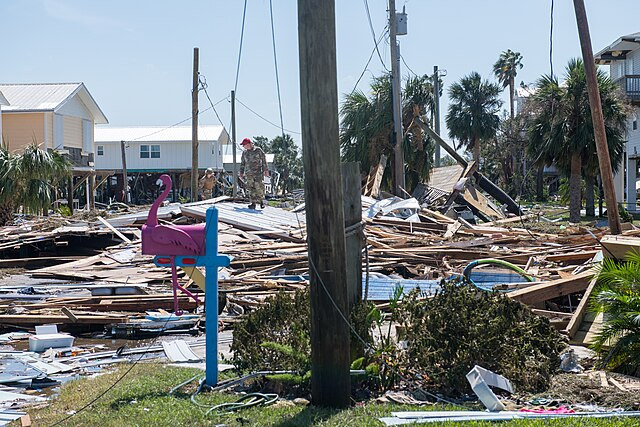Hurricane Helene has officially become one of the deadliest storms to hit the United States in the 21st century, with the death toll reaching at least 215 people as of Thursday. Rescue operations continue across six southeastern states, one week after the Category 4 storm made landfall in Florida, bringing unprecedented flooding and destruction. The storm's impact has extended beyond human casualties, with widespread damage to infrastructure, businesses, and iconic landmarks, including North Carolina's famed Biltmore Estate.
The deadly storm, which ranks as the third deadliest in the U.S. this century after Hurricane Katrina (2005) and Hurricane Maria (2017), wreaked havoc as it moved inland, producing devastating floods and landslides, particularly in the southern Appalachian region. According to Yale Climate Connections, Helene bears striking similarities to Hurricane Camille, a Category 5 storm in 1969, which also caused catastrophic flooding across the Appalachians. "The majority of Camille's 259 U.S. deaths came from flash flooding," Yale Climate Connections noted, a pattern now echoed in Helene's path of destruction.
The National Weather Service recorded historic rainfall totals in parts of the southeastern U.S., with areas like Asheville, North Carolina, receiving nearly 14 inches of rain in just two days, from September 25 to 27. The intense rainfall triggered record flood levels on several rivers, causing widespread destruction across communities in Georgia, South Carolina, Tennessee, Virginia, and North Carolina. Floodwaters inundated homes, damaged roads, and knocked out power for thousands, forcing residents to evacuate and seek shelter.
NASA's Earth Observatory reported that a "predecessor rain event" coupled with Helene's main storm system brought torrential downpours to southern Appalachia, compounding the storm's deadly effects. "Deadly and destructive flooding occurred as a result in eastern Tennessee, western Virginia, and North Carolina," the agency confirmed. Preliminary assessments indicated rainfall totals exceeding 10 inches across large swaths of the region, with extensive damage to infrastructure and agriculture.
Climate experts, including Axios' senior climate reporter Andrew Freedman, have noted that climate change is contributing to more intense storms like Helene. Warmer ocean temperatures, driven by global climate change, are fueling storms, leading to rapid intensification and heavier rainfall. This trend has been observed across the Atlantic, where hurricanes have become increasingly severe in recent decades.
In addition to its human toll, Hurricane Helene also inflicted significant damage on one of North Carolina's most famous landmarks, the Biltmore Estate. The 8,000-acre property, home to America's largest privately-owned house, suffered extensive flooding and wind damage. Although the main house, winery, and hotels emerged relatively unscathed, the estate's low-lying areas, including Biltmore Village and surrounding farms, were not so fortunate. "We are deeply grateful for the outpouring of concern for our region," the estate said in a statement, acknowledging the destruction caused by the storm.
Crews are currently assessing the damage to the estate, with efforts focused on clearing roads and repairing flood-damaged buildings. The estate's farm lost several animals during the storm, though the majority of livestock were saved, thanks to the efforts of the estate's agriculture and equestrian teams. The estate remains closed to visitors as repairs continue, with a tentative reopening planned for mid-October.
The Biltmore Estate, built in the late 19th century by George Washington Vanderbilt II, is one of the region's top tourist attractions, drawing more than 1.4 million visitors annually. Its closure is expected to have a significant economic impact on Asheville and the surrounding areas, as tourism is a cornerstone of the local economy. Marissa Jamison, Senior Public Relations Manager at Biltmore, emphasized the need to focus on the broader community in the wake of the disaster. "We ask that the public put their focus on our deeply devastated broader community and region at this time and contribute to the relief efforts if they have the means to do so," Jamison said in a statement to The Post.




